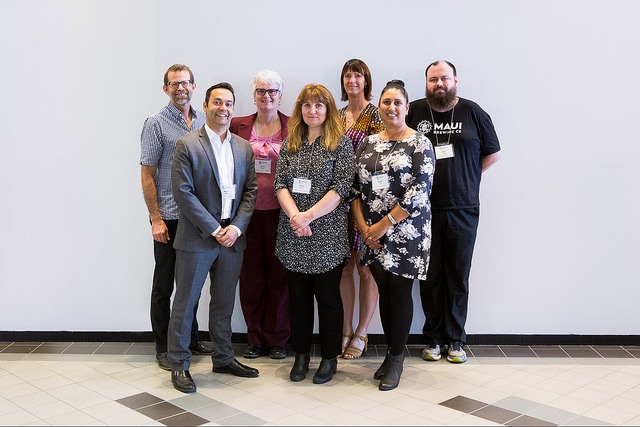1 Introduction
What is Open Education?
Open education encompasses resources, tools and practices that employ a framework of open sharing to improve educational access and effectiveness worldwide (Open Education Consortium). This includes the creation, adaptation, and adoption of open educational resources (OER), the benefits of which include gains in course performance, student retention, and program completion (Hilton, 2016; Hilton, Fischer, Wiley, & William, 2016). It also includes open pedagogies that involve designing architectures and using tools for learning that enable students to shape the public knowledge commons of which they are a part.
Kwantlen Polytechnic University is a sector leader in open education
Open education at KPU encompasses diverse activities that support program areas and lead the development of innovative global education initiatives. This includes the creation, adaptation, and adoption of open educational resources, our Zero Textbook Cost (ZTC) programs, and a diverse range of innovative open pedagogies.
As a special purpose teaching university with an open access mandate, we are committed to affordable education and to crafting new ways to enable learners to realize their ambition and career plans. We encourage and emphasize new ways our faculty engage with colleagues worldwide in innovative knowledge-practice networks to improve the learning experience. Through this approach we serve as a model for the way our graduates will engage with their own professional and practice communities.
Highlights:
KPU leads British Columbia post-secondary institutions in the adoption of open textbooks and other open educational resources.
On November 1, 2017 KPU launched Canada’s first Zero Textbook Cost (ZTC) program, which enables students to complete their first year of study and earn the Certificate of Arts with zero required textbook costs. This was followed by the launch of a second ZTC program in August 2018 (the Adult Graduation Diploma), a third in March 2019 (the Associate of Arts in General Studies), and three more in July 2019 (the Diploma in General Studies, the Associate of Arts Degree in Sociology, and the Certificate in Foundations in Design). In October 2019 KPU launched North America’s very first four-year ZTC program in the form of the Bachelor of Arts Degree in General Studies. Across six semesters, this initiative has saved KPU students an estimated $3.1 million.
Many faculty and staff at KPU have embraced open pedagogies and work with students to create open educational resources. Still others have authored or adapted open textbooks. Their work is supported by OPUS, the Library’s Open Publishing Suite.
KPU is known for its research on open education and textbook affordability. This research has shown that a majority of post-secondary students in British Columbia do not purchase at least some of their required textbooks because of their high cost and that a significant minority of students choose or withdraw from courses because of textbook costs. At the same time, open textbook efficacy research at KPU has shown that students assigned free and open textbooks in place of perform the same as or better than those assigned expensive commercial textbooks.
KPU is a member of the Open Education Consortium, the International Council for Open and Distance Education, and the Creative Commons Global Network. We collaborate with Montgomery College (Maryland, USA) for our UN SDG Open Pedagogy Fellowship program and with Keene State College (New Hampshire, USA) for a virtual Open Pedagogy Learning Community. We are also an anchor partner of the OER universitas and are working collaboratively with like-minded institutions worldwide to build open online courses to serve under-served populations and widen access to post-secondary education.
Members of the KPU community have been recognized for their leadership in open education, including through multiple awards from BCcampus1 2 3, multiple research fellowships from the Open Education Group, and invited participation in UNESCO and UN events. KPU’s open education initiatives are routinely profiled in local, national, and international outlets.

KPU’s leadership in open education is a product of both strong grassroots support across the institution and strong support from senior leadership. Internally, we owe much of our success to the diligent and thoughtful efforts of members of KPU’s Open Education Working Group while externally, our close and ongoing partnership with BCcampus Open Education has been critical to our progress. Over the past three years, KPU’s open education initiatives have grown in both scope and impact thanks in part to dedicated support in the forms of a 1-year appointment of a University Teaching Fellow in Open Studies (via a 50% course release) in 2017, a Special Advisor to the Provost on Open Education in 2018, and, most recently, the establishment of the new position of Associate Vice Provost, Open Education in 2019.
In 2018, KPU hit another milestone, with at least one open textbook creation, adaptation, or adoption project within each Faculty and School at KPU. This progress and momentum, together with the aforementioned internal and external support and the initiation of broader institutional vision and academic planning initiatives, positioned KPU perfectly to embark on its first strategic plan for open education.
This living document outlines a vision and strategy for KPU’s open education initiatives for the next five years. It was drafted in collaboration with the KPU Open Education Working Group along with other key internal stakeholders (see the list of contributors) and in conjunction with Vision 2023 and Academic Plan 2018-2023, and refined after seeking feedback from the wider KPU community and key external stakeholders (e.g., BCcampus). In the spirit of openness, this plan has been drafted and revised on the open web, using the very tools and technologies (Pressbooks and H5P) that we use to support the creation of open textbooks. The plan has also been intentionally published with a Creative Commons Attribution 4.0 International License in order to facilitate reuse and adaptation in other contexts. I invite you to provide your feedback by annotating this document using Hypothes.is or by sending an email to open@kpu.ca
Rajiv Jhangiani, Ph.D.
Associate Vice Provost, Open Education

Published: September 2018
Last updated: October 2019

